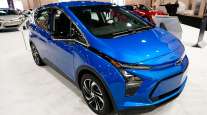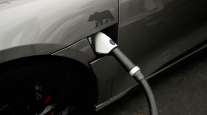Senior Reporter
Eaton to Invest $500 Million in New eMobility Business

Power management company Eaton Corp. announced plans to invest $500 million over the next five years in its new eMobility business to develop smart diagnostic technologies, intelligent power electronics and predictive monitoring for a range of electrified vehicles.
Eaton has not given any details on the timing of the eMobility research and development investment.
“I can’t give you that right now. But really the message that we are signaling with that investment commitment is that we are committed to this market,” Scott Adams, senior vice president of product development, marketing and planning at Eaton, told Transport Topics. “We believe it is going to happen. We believe it is complementary to our traditional vehicle business and we are committed to invest.
We are proud to announce the formation of Eaton eMobility, a new group that brings together our strengths in electrical and vehicle know-how. Bring us your technical challenges, and we’ll bring you innovative, forward-thinking solutions. Learn more at: https://t.co/6HhSy31Wof pic.twitter.com/9LiyZ75TLl
— Eaton (@eatoncorp) June 26, 2018
The $500 million is not Eaton’s overall research and development, but is specific to the eMobility business, he added.
The eMobility unit — introduced to investors in the first quarter and now being rolled out more generally — focuses on three primary areas for automotive and commercial vehicle customers: intelligent power electronics, power systems and advanced power distribution and circuit protection.
The power distribution and protection category includes fuses, super capacitors and power distribution units, while converters and on-board chargers fall under the power electronics umbrella. Power systems include electric vehicle transmissions for a variety of medium- and heavy-duty applications, as well as a 48-volt regenerative accessory drive system for heavy-duty trucks, according to Southfield, Mich.-based eMobility.
The eMobility business had sales of $77 million in the first quarter, according to Eaton’s report for the period ended March 31. Eaton projects its current electrified portfolio will account for about $300 million in revenue in 2018, and forecasts revenue of $2 billion to $4 billion by 2030 as new products and customers are added to the eMobility portfolio.
Commercial vehicles are expected to play a leading role in its growth, Adams said.
“We have continued to invest in systems that work for plug-in hybrid and battery electric commercial vehicles. But what is unique about our eMobility segment is we are pulling in elements of our electrical business that also makes high-voltage and high-powered electronics that go into these vehicles,” Adams said.
Stringent state and federal emissions regulations, especially of carbon dioxide, scheduled for the years ahead are key factors driving the shift to electrification of commercial vehicles, he said.
“So we see the need for customers to electrify their trucks to a certain degree depending on the segment, to hit those regulations,” Adams said.
Battery electric technology is likely to penetrate commercial vehicles operating along shorter routes, he said. In the heavy-duty, longhaul sector it will be a 48-volt hybrid electric architecture, which enables certain features in the vehicle like engine-off coasting and maybe “hoteling” for the sleeper cab market to improve fuel efficiency and lower emissions.
The global vehicle electrification market is projected to grow to 15 million pure battery-electric vehicles and another 30 million hybrids, from mild to plug-in, by 2030, according to the company.
eMobility has design centers and manufacturing locations in Asia, Europe and the Americas, and has 1,200 employees.
Dublin-based Eaton had 2017 sales of $20.4 billion. It has 96,000 employees and sells products to customers in 175 countries.





